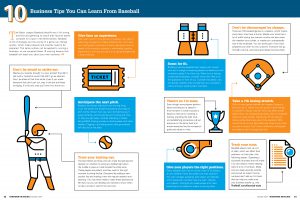
Click the picture to download a PDF of this story.
The Major League Baseball playoffs are in full swing, and fans are gathering to watch their favorite teams compete for a spot in the World Series. Baseball is full of strategy, but the course of a game can change quickly, which means players and coaches need to be prepared. This same outlook can be applied to running a business, so we compiled these 10 winning lessons that baseball can teach you about your own.
1. Don’t be afraid to strike out.
Maybe you recently brought in a new product that didn’t sell well or hosted an event that didn’t go as planned. Don’t be afraid of that third strike. Even if you make decisions that don’t pan out, stay in the box and keep swinging. It’s the only way you’ll ever hit a home run.
2. Give fans an experience.
Each team has 81 home games in a season, but often it takes only one game to create a lifetime fan. From how your staff greets customers to store cleanliness and the speed of the checkout process, a memorable, positive experience is one way you can turn a casual shopper into a loyal customer.
3. Anticipate the next pitch.
Retailers are always looking for the next big thing, much like batters are always anticipating what type of pitch will be thrown their way next. Sometimes you’ll guess correctly, and sometimes you’ll swing and miss. To help you get ready, consider attending a market, taking NRHA training courses or sharing ideas with other retailers. Digging in and doing some initial groundwork will help you at the plate.
4. Train your batting eye.
The best hitters are those who can make the split-second decision on whether to swing at a fastball right down the middle or pass on a ball outside the strike zone. These players are patient, and they wait for the right moment to swing the bat. Decisions like adding a new product line and making a new hire require research and planning. You may never need to make these decisions at 90 mph, but you can develop your senses to know when to take a swing or wait for the next one.
5. Scout for fit.
Building a winning baseball team begins with scouts who are in charge of observing players to determine who would be a good fit for their club. When you’re looking at potential employees, consider more than what is on the application in front of you. Consider the person, too, and decide whether they complement your company’s culture and your existing team members.
6. There’s no I in team.
Even though some players perform above and beyond, at season’s end, the team’s overall success is based on total wins. Investing in training, providing the right tools and establishing procedures will put everyone on the same track and ensure everyone has the company’s goals and values in mind.
7. Give your players the right positions.
Every baseball team has an active roster of 25 players, all with different skills that determine their positions. The club manager evaluates each player and decides which placement will best help the team. Identify your players’ strengths and weaknesses and make adjustments as needed to create a winning team.
8. Don’t be discouraged by slumps.
There are 162 baseball games in a season, which means every team may have a slump. Maybe your store has a lot of traffic during the warmer months and less when the weather turns colder, or maybe you unexpectedly lose a key employee. You can avoid panic if you have prepared your team for any outcome. Everyone will go through a slump, and every good player bounces back.
9. Take a 7th inning stretch.
With so many games packed into a season, fatigue is bound to set in. Hitters may lose power in their swings or a pitcher’s velocity may fall, which can affect overall performance. As a hardworking retailer, learn to recognize when you need a break. Taking time off can help you refocus while others take care of the operation. Who knows? Some of your best ideas may come to you when you take a timeout. You’ll return refreshed, re-energized and ready to take it through the ninth.
10. Track your stats.
Baseball players rack up a lot of stats, which can affect their positions—or their jobs—the following season. Operating a successful business that will make it to next season means keeping track of a lot of numbers. Make sure you keep accurate records and consult an expert if some numbers don’t add up. For tools that can help you make sure your business stacks up, click here.
 Hardware Retailing The Industry's Source for Insights and Information
Hardware Retailing The Industry's Source for Insights and Information








